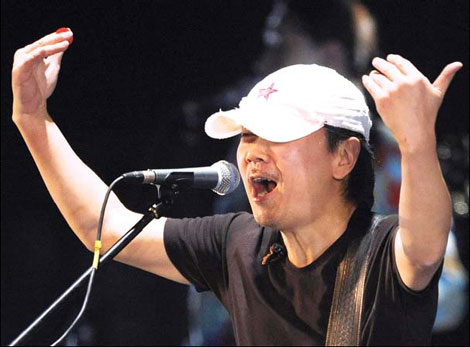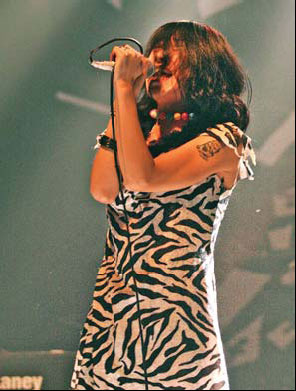

 |
|
Cui Jian is known as the "godfather of Chinese rock". Zou Hong / China Daily |
Near the start of the documentary, Down: Inside Rock in the PRC, co-director Andrew David Field asks Kang Mao, the outspoken female lead singer of the Subs: "So, what do you think of Cui Jian?"
"Cui Jian is handsome. Cui Jian is the godfather," the singer replies.
"How about the Subs? Ever heard of that band?" Field continues.
Kang says: "Nobody has heard of the Subs. People just know Cui Jian. The Subs are a bit strange."
The filmmaker was on a train with the Subs to Changsha, capital of Hunan province, where they would perform with Cui Jian, who's known as the "godfather of Chinese rock", in 2007.
Field has been in China on and off for more than 25 years, since his first visit in 1988. He has long been familiar with Shanghai's jazz scene and watched some Chinese rock bands in Beijing in 1996. Most were cover bands, doing renditions of songs by such Western bands as Nirvana and Oasis.
It was a far cry from his experience on the road for two years with the Subs, with whom he traveled to such cities as Hubei's capital Wuhan, Changsha and Shanghai.
He became very familiar with how the Subs traveled and were treated by concert organizers.
Field condensed the experience into a 52-minute documentary. The film also features several other bands from China's growing indie scene, including the Beijing-based bands Carsick Cars, Hedgehog, PK-14, Lonely China Day and Re-Tros, and the Shanghai-based outfit Flying Fruit, and Cui Jian.
Field interviewed bands, club owners and promoters in every venue from the sweaty stages of dark underground clubs to huge outdoor rock festivals across China. He says the film itself represents a process of research - not a polished story produced on paper before filming started.
"Therefore, it's a more honest approach, more of a true documentation than a prefabricated story about rock bands in China," he says.
In November 2006, Field attended a concert at the Yugong Yishan rock club in Beijing, which featured Kaiser Kuo's band Spring and Autumn. The band was followed by an AC/DC cover band led by Jaime Welton.
"It was my first time attending a rock club in China since the 1990s," Field says.
"The energy level was great, and I liked watching the Chinese and Westerners in the audience reacting in such a visceral way to what was going on onstage."
He had a camera and started filming the bands and audience. It then struck him that this sort of scene would be a great subject for a documentary film about life in contemporary urban China.
He hadn't seen this scene before and figured most people outside China - and even most in the country - didn't know anything about it.
In June 2007, Field was in Beijing and was filming a two-day music festival at the club Dos Kolegas. The Subs was the last band to play.
At first he couldn't take their sound. It was too raw and powerful, and he had to step outside. When he returned to the venue, he found the energy to be carnal.
"It was primal," he says.
"I knew this band would play a big role in my film."
In one of their hit songs, Down, Kang sings:
"One, one, no money, keep the naked body. Two, two, no family, like the first day. Three, three, no job, throw away the old cage. Four, four, no future, come down to rock 'n' roll."
The filmmaker decided to name his documentary after the song.
 |
|
Rock singer Kang Mao takes the lead role in the documentary Down: Inside Rock in the PRC. Provided to China Daily |
Their album, Down, was selected as the Best Album of the Year by the Chinese edition of Rolling Stone. The namesake song, Down, was also awarded the Best Song of the Year.
"We don't belong to the upper class, and we don't want to compromise with the commercial market," says Kang, who founded the band in 2002.
"We want to be real and independent."
The Subs' name sounds like "sha bu si" in Chinese, which means, "never be killed". This shows the band's spirit.
"I guess that spirit is what they want to record," the singer says.
It wasn't the first time the Subs were filmed as a leading role in a documentary. Norwegian documentary director Karen Winther put the Subs in the leading role in her documentary, Rock Heart Beijing, which recorded the band's 2007 tour in Norway.
"We don't feel nervous facing the camera," Kang says.
"We keep it real under any circumstances."
Field says: "The bands all take their art very seriously, and their music and lives reflect that spirit. Indie rock bands in China aren't about bling bling and becoming international celebrities. They don't ride around in limousines. They lead very austere lives and are very dedicated to their craft."
That sentiment was shared by Jud Willmont, who co-wrote, produced and edited the film.
"This film was made with sweat equity," he says.
"Andrew and I share that and were able to make this film out of passion and friendship."
Chinese director Zhang Yuan released the film Beijing Bastards in 1993, in which Cui Jian plays himself.
"It is very raw, and you get to see how people like Cui Jian lived in those days," Field says.
But in Down, which is narrated by two Western filmmakers, rock is no different in China and the West - loud, jarring and in-your-face.
The documentary has already been accepted by two film festivals - Thin Line in Texas and NXNE in Toronto.
Its two filmmakers self-financed the documentary and spent four years on it. Neither had any idea how much work it would involve or how long it would take.
Field did all the filming of the rock bands. Willmont mainly helped structure the story and assisted Field to write the narration.
They also gathered friends' feedback.
Willmont also points out the ideas and struggles expressed by the featured rock musicians aren't unique to China.
"So, in this way, we're bringing China and the West together, too," Willmont says.
chennan@chinadaily.com.cn